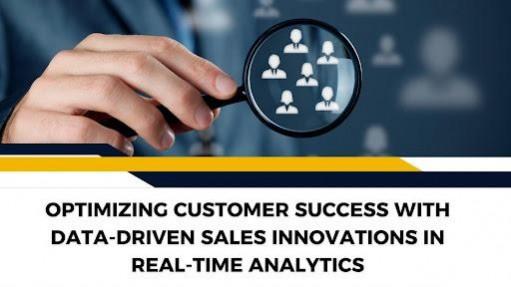
In today's fast-paced digital economy, businesses are leveraging advanced data analytics and real-time processing to optimize customer success. Achyuth Reddy Lakhireddy, an expert in data-driven sales optimization, explores how machine learning, cloud-native architectures, and real-time analytics are transforming customer engagement strategies. By integrating intelligent automation and predictive modeling, organizations can improve conversion rates, enhance customer experiences, and drive operational efficiency. This shift towards data-driven decision-making is reshaping industries, empowering businesses to adapt quickly to changing market conditions.
Revolutionizing Sales with Real-Time Data Processing
The ability to process and analyze real-time customer data is a game-changer for businesses. With cloud-based infrastructures and streaming data technologies, companies can monitor customer interactions, track behavioral patterns, and adapt marketing strategies dynamically. Real-time analytics enables organizations to respond instantly to customer needs, reducing delays in service delivery and optimizing engagement. Technologies like Apache Kafka and Kubernetes allow businesses to scale efficiently while ensuring reliability.
Machine Learning and AI for Customer Success
Artificial intelligence and machine learning are at the core of modern customer engagement platforms. Predictive analytics models assess historical data and real-time inputs to anticipate customer needs, personalize interactions, and improve retention. Transformer-based reinforcement learning algorithms are now being deployed to refine decision-making in sales processes, ensuring targeted recommendations. These AI-driven insights enhance conversion rates by delivering relevant solutions at the right time.
Enhancing Customer Experience with Personalization
Modern sales optimization platforms are shifting toward hyper-personalization by analyzing individual customer journeys. AI-powered recommendation engines offer tailored promotions, suggest relevant products, and create dynamic customer experiences. Personalization engines use behavioral analytics to refine content strategies, ensuring that marketing efforts resonate with specific segments. This data-driven approach fosters stronger customer relationships and increases satisfaction.
Cloud-Native Architectures for Scalability and Performance
Cloud-native architectures have enabled businesses to scale customer success platforms efficiently. Technologies like Kubernetes for container orchestration and Redis for caching enhance responsiveness and ensure high availability. Cloud infrastructure allows dynamic resource allocation based on traffic demand, reducing downtime and optimizing performance. As a result, systems handle large-scale operations with minimal latency.
Data Flow Management and Event Streaming
Real-time customer interactions require a well-orchestrated data pipeline. Apache NiFi and Kafka streaming architectures enable businesses to process and route data efficiently, ensuring seamless integration between sales, marketing, and support teams. Event-driven architectures allow organizations to track customer activities across multiple touchpoints, providing actionable insights.
Optimizing Sales Strategies with AI-Driven Insights
Sales teams leverage AI-driven insights to refine strategies and maximize revenue. Machine learning models analyze behaviors, sentiment, and engagement to provide intelligent sales recommendations. AI-powered forecasting tools help businesses predict demand, optimize pricing, and allocate resources. By aligning sales with data-driven insights, organizations achieve growth and higher conversion rates.
Improving Customer Retention Through Predictive Analytics
Retaining customers requires proactive engagement strategies based on predictive analytics. Businesses use churn prediction models to identify at-risk customers and implement retention initiatives. AI-powered retention strategies, such as personalized outreach and loyalty programs, improve retention and reduce acquisition costs.
Future of Data-Driven Customer Success
The future of customer success will be shaped by AI advancements, real-time automation, and adaptive analytics. Businesses will integrate self-learning AI systems capable of refining engagement strategies. As cloud technologies evolve, organizations will gain access to more powerful data processing tools to enhance decision-making and customer interactions.
In conclusion, data-driven sales optimization is transforming customer engagement, leveraging AI, cloud computing, and real-time analytics. Businesses that adopt intelligent automation and predictive modeling can improve performance, increase retention, and streamline operations. By continuously refining these technologies, organizations can stay ahead in an increasingly competitive market. Achyuth Reddy Lakhireddy's insights highlight the importance of integrating scalable cloud architectures and analytics to drive growth in the digital economy.















